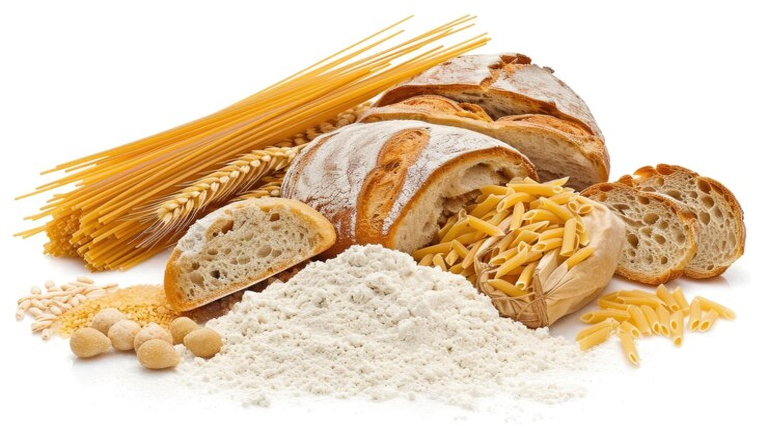Carbohydrates, often referred to as “carbs,” are one of the three primary macronutrients, alongside fat and protein. They serve as the body’s main source of energy and play a crucial role in various bodily functions. Despite their importance, carbs are often misunderstood, with many people associating them solely with weight gain. However, not all carbs are created equal—some are essential for optimal health, while others should be consumed in moderation.
In this comprehensive guide, we will explore what carbohydrates are, their structure, functions, types, and their impact on metabolism, blood sugar, and overall health.
What Are Carbohydrates? (Carbohydrates Definition)
Carbohydrates are organic compounds made up of carbon, hydrogen, and oxygen atoms. They are classified as saccharides (sugars) and are the primary energy source for the body. The monomer of carbohydrates is a monosaccharide, which includes glucose, fructose, and galactose.
Carbohydrates Formula
The general chemical formula for carbohydrates is (CH₂O)n, where “n” represents the number of carbon atoms.
Examples of Carbohydrates
-
Simple carbohydrates: Table sugar (sucrose), fruit sugar (fructose), milk sugar (lactose)
-
Complex carbohydrates: Starch (found in potatoes, rice), fiber (found in whole grains, vegetables)
Classification of Carbohydrate (Types of Carbohydrate)
Carbohydrates are categorized into three main types based on their chemical structure:
1. Simple Carbohydrate (Sugars)
Simple carbs consist of one or two sugar molecules and are quickly digested, leading to rapid spikes in blood sugar.
-
Monosaccharides (Single sugar units):
-
Glucose (Primary energy source)
-
Fructose (Found in fruits)
-
Galactose (Found in dairy)
-
-
Disaccharides (Two sugar units):
-
Sucrose (Glucose + Fructose)
-
Lactose (Glucose + Galactose)
-
Maltose (Glucose + Glucose)
-
Carbohydrates foods to avoid (refined simple carbs):
-
Soda, candy, pastries, white bread
2. Complex Carbohydrate (Starches and Fibers)
Complex carbs contain long chains of sugar molecules, making them slower to digest. They provide sustained energy and help regulate blood sugar.
-
Starches: Found in grains, legumes, potatoes
-
Fibers: Found in vegetables, fruits, whole grains
Healthy sources of carbs:
-
Quinoa, brown rice, oats, sweet potatoes, beans
3. Dietary Fiber (A Special Type of Carb)
Fiber is indigestible but crucial for digestive health, weight management, and heart health.
-
Soluble fiber (dissolves in water, helps lower cholesterol)
-
Insoluble fiber (promotes bowel movements)
Functions of Carbohydrates in the Body
Carbohydrates play several vital roles, including:
1. Primary Energy Source
Carbs are broken down into glucose, which fuels the brain, muscles, and organs.
2. Supporting Metabolism
They help in fat metabolism, preventing the body from using protein as an energy source.
3. Maintaining Blood Sugar Levels
Complex carbohydrates provide a steady release of glucose, unlike simple carbs, which cause blood sugar spikes.
4. Aiding Digestion
Fiber promotes gut health and prevents constipation.
5. Supporting Brain Function
The brain relies on glucose for optimal cognitive performance.
Good Carbs vs. Bad Carbs (Glycemic Index & Health Impact)
Not all carbs are equal—some are nutrient-dense, while others offer empty calories.
Good Carbs (Low Glycemic Index)
-
Whole grains (oats, quinoa)
-
Fruits (berries, apples)
-
Vegetables (broccoli, spinach)
-
Legumes (lentils, chickpeas)
Bad Carbs (High Glycemic Index)
-
Refined sugars (soda, candy)
-
White bread, pastries
-
Processed snacks (chips, crackers)
Glycemic index (GI) measures how quickly a food raises blood sugar. Low-GI foods are better for sustained energy and weight management.
Carbohydrate and Weight Management
Carbs are often blamed for weight gain, but the type and quantity matter most.
How Carbs Affect Weight
-
Excess simple carbs → Stored as fat
-
Fiber-rich complex carbs → Promote satiety, aid digestion
Low-Carb and Keto Diets
-
Low-carb diets reduce carb intake to promote fat burning.
-
Keto diet drastically cuts carbs, forcing the body into ketosis (burning fat for fuel).
However, healthy carbohydrates are essential for long-term energy and nutrient intake.
Carbohydrates: Types, Examples, and Health Impact
| Category | Type | Examples | Digestion Speed | Effect on Blood Sugar | Health Impact |
|---|---|---|---|---|---|
| Simple Carbohydrates | Monosaccharides | Glucose, Fructose, Galactose | Fast | Rapid spike | Short-term energy, may lead to crashes |
| Disaccharides | Sucrose, Lactose, Maltose | Fast | Rapid spike | Found in sweets, soda (limit intake) | |
| Complex Carbohydrates | Starches | Potatoes, Rice, Whole Grains | Slow | Gradual rise | Sustained energy, supports digestion |
| Dietary Fiber | Oats, Beans, Vegetables | Very slow | Minimal effect | Improves gut health, lowers cholesterol | |
| Refined Carbs | Processed Sugars & Grains | White bread, Pastries, Candy | Very fast | Sharp spike | Linked to weight gain, avoid excess |
Best Sources of Carbohydrates (Carbohydrates Food List)
Healthy Carbohydrate Foods
✔ Whole grains: Brown rice, oats, quinoa
✔ Fruits: Berries, bananas, apples
✔ Vegetables: Sweet potatoes, broccoli, carrots
✔ Legumes: Beans, lentils, chickpeas
Carbohydrates Foods to Avoid
❌ Refined sugars (candy, soda)
❌ White bread, pasta
❌ Pastries, cookies
Conclusion: Balancing Carbs for Optimal Health
Carbohydrates are a crucial part of a balanced diet, providing energy, supporting metabolism, and aiding digestion. The key is choosing complex carbohydrate over refined sugars and balancing intake based on activity levels and health goals.
By understanding what carbohydrates are, their functions, and their impact on blood sugar and weight, you can make informed dietary choices for long-term wellness.
Would you like to reduce carbs or focus on healthier sources? Let us know in the comments!
FAQs About Carbohydrates
Q: What are the main types of carbohydrate?
A: Simple carbs (sugars) and complex carbs (starches & fiber).
Q: Do carbs make you fat?
A: Excess refined carbs can contribute to weight gain, but fiber-rich carbs support weight management.
Q: Are carbs bad for a keto diet?
A: Keto restricts carbs to induce ketosis, but some low-carb veggies are allowed.
Q: What’s the best time to eat carbs?
A: Around workouts for energy or in moderation throughout the day.
By following this guide, you can optimize your carb intake for better health and energy! 🚀


